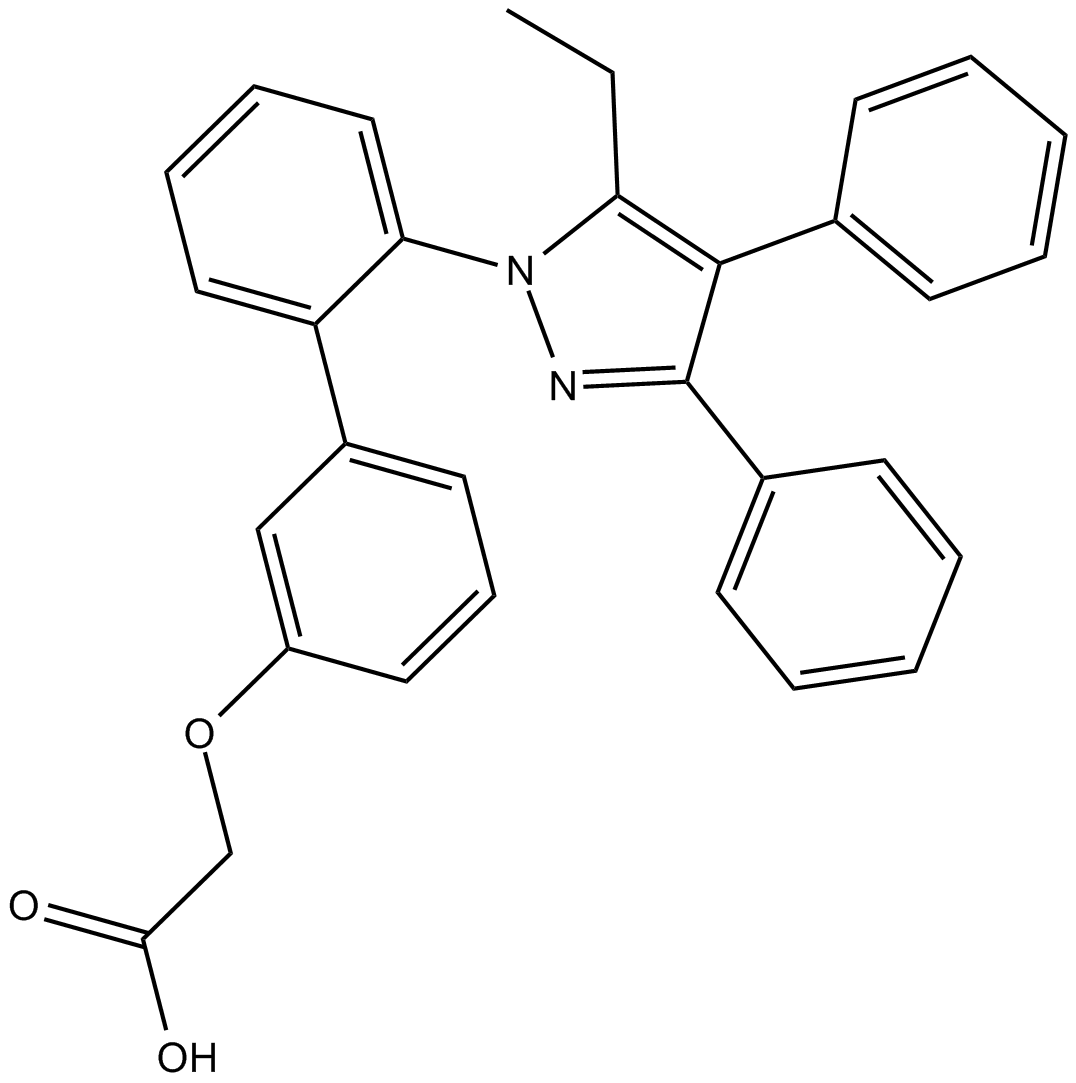BMS 309403 (Synonyms: Adipocyte FABP Inhibitor, AFABP Inhibitor, ALBP Inhibitor, aP2 Inhibitor, FABP4 Inhibitor, Fatty Acid Binding Protein 4 Inhibitor) |
| Catalog No.GC11894 |
BMS 309403 es un potente inhibidor de la proteína de unión a ácidos grasos de adipocitos (también conocido como FABP4, aP2) activo por vía oral y selectivo con Kis de \u003c2, 250 y 350 nM para FABP4, FABP3 y FABP5, respectivamente.
Products are for research use only. Not for human use. We do not sell to patients.

Cas No.: 300657-03-8
Sample solution is provided at 25 µL, 10mM.
BMS309403 is specifically designed to target FABP4 with a Ki value less than 2 nM. It is a potent and selective FABP4 inhibitor.[1]
Fatty acid binding proteins (FABPs) are small-molecular weight hydrophobic proteins containing a large hydrophobic cavity, into which naturally occurring long-chain fatty acids and synthetic hydrophobic ligands can be accepted. FABPs act as transporters of endogenous fatty acids from the cell surface to various sites of fatty acid storage and metabolism. In addition to the roles of FABP4 in regulating lipid metabolism and insulin sensitivity, recent pharmacological and biological findings have indicated a regulatory function of FABP4 in inflammation. FABP4 is expressed mainly to macrophages and inflammatory response[1,2]
BMS309403 is an aromatic biphenyl azol compound that competes with fatty acids for the binding pocket of A-FABP with high specificity. BMs30940323 has been shown to lower Mcp-1 secretion from thp-1 macrophages.[3,4]
Chronic administration of BMS309403 (15 mg/kg/day; from 12 to 18 weeks of age) in ApoE-/-mice significantly improved therelaxations, maximal relaxation and EC50 to UK14304, acetylcholine and A23187. Mice orally BMS309403 significantly increased glucose uptake in myotubes in a time and dose dependent manner. Administered with BMS309403 are effectively protected against severe atherosclerosis and type 2 diabetes.[3,4]
References:
[1]Okada T, Hiromura M, Otsuka M etal. , Synthesis of BMS-309403-related compounds, including [¹⁴C]BMS-309403, a radioligand for adipocyte fatty acid binding protein. Chem Pharm Bull (Tokyo). 2012;60(1):164-8.
[2]Suhre K, Römisch-Margl W, de Angelis MH etal. , Identification of a potential biomarker for FABP4 inhibition: the power of lipidomics in preclinical drug testing. J Biomol Screen. 2011 Jun;16(5):467-75
[3] Lin W1, Huang X, Zhang Letal. , BMS309403 stimulates glucose uptake in myotubes through activation of AMP-activated protein kinase. PLoS One. 2012;7(8):e44570.
[4] Lee MY, Li H, Xiao Y, Zhou Z, Xu A, Vanhoutte PM. Chronic administration of BMS309403 improves endothelial function in apolipoprotein E-deficient mice and in cultured human endothelial cells. Br J Pharmacol. 2011 Apr;162(7):1564-76.
Average Rating: 5 (Based on Reviews and 14 reference(s) in Google Scholar.)
GLPBIO products are for RESEARCH USE ONLY. Please make sure your review or question is research based.
Required fields are marked with *




